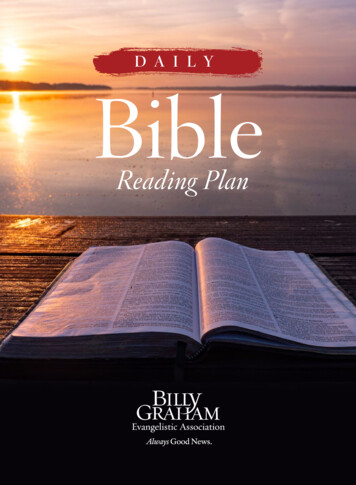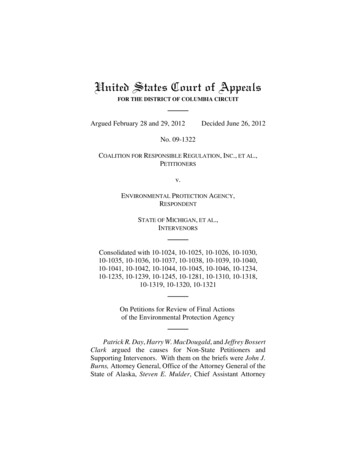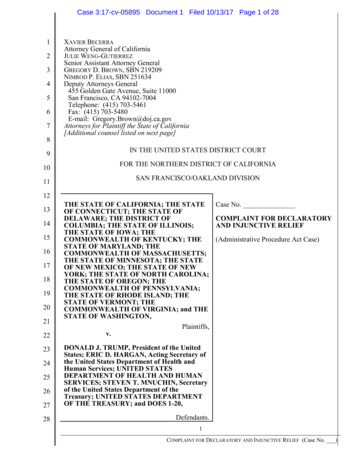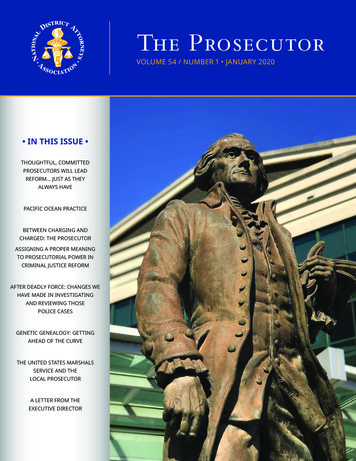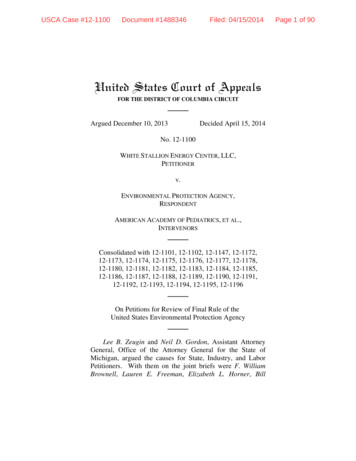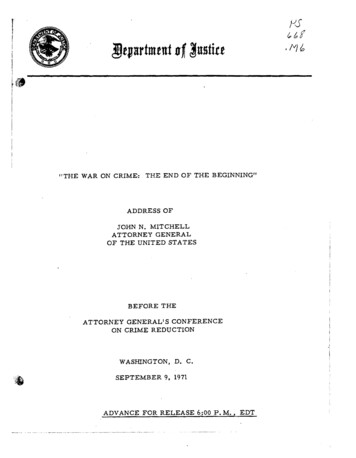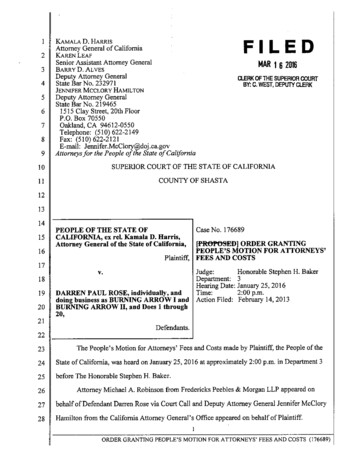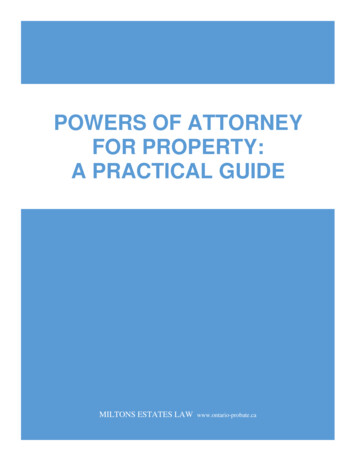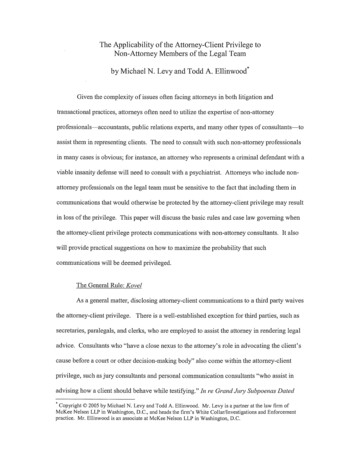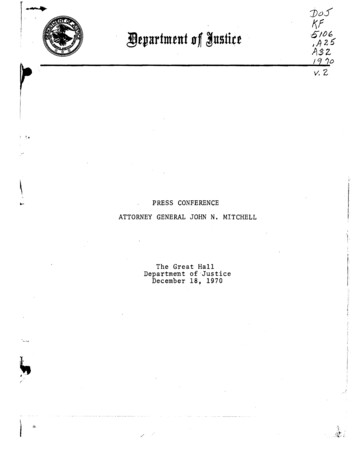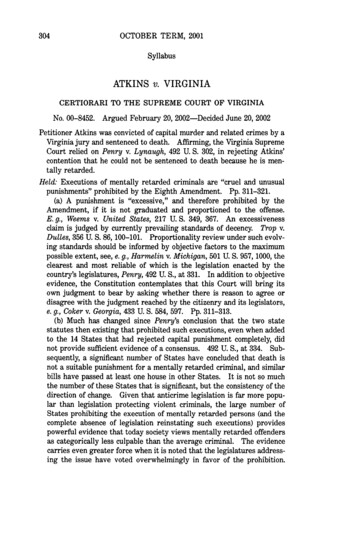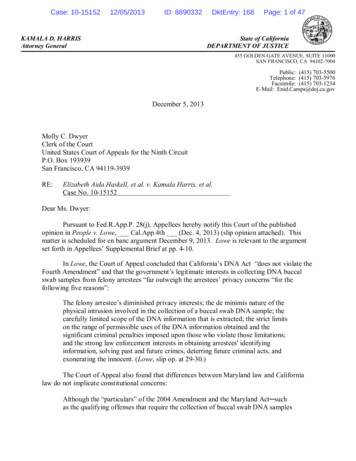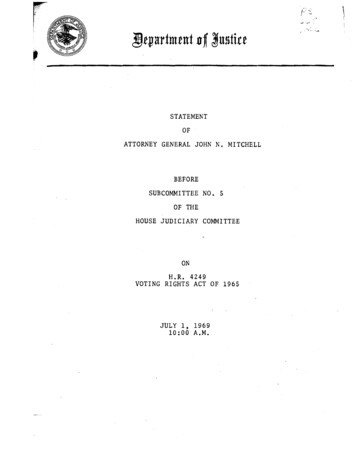
Transcription
STATEMENTOFATTORNEY GENERAL JOHN N. MITCHELLBEFORESUBCOMMITTEE NO. 5OF THEHOUSE JUDICIARY COMMITTEEONH.R. 4249VOTING RIGHTS ACT OF 1965JULY 1, 196910:00 A.M.
Mr. Chairman and members of this Subcommittee,I want to thank you again or your courtesies in schedulingthese hearings so as, to permi t me to meet my prior commi tments,particularly last Thursday.Mr. Chairman, at the hearing last week you askedfor five lists of information for insertion into the hearingrecord.With your permission, I will hand you a lettercontaining this information at this time.In addition, may I submit a memorandum setting forththe Constitutional basis for our proposal and the decisions ofthe Supreme Court supporting it.With your permission,I, would ask that the memorandum also be made a part of thetestimony.When I testified last Thursday, I presented my viewsand the views of this Administration as to what is the bestlegislative solution to the problems of discrimination invoting and to our commitment to encourage citizens to vote.There was some discussion before this Committee asto my personal motives and to the political situation.Perhaps I did not make myself clear and I,would, withthe permission of the Chairman, like to make a few additionalcomments.The proposal for a simplefive yearextension of the1965 Voting Rights Act leaves the unde,reducated ghettoas today's forgotten man in voting rightslegislatio .N gro
He would be forgotten both in the 13 states outsidethe South which have literacy tests now and in the 30 otherstates which have the ability, at any time, to impose them.It is not enough to continue to protect Negro votersin seven states.That consideration may have been the justifica tion for the 1965 Act.But it is unrealistic odayto ignorethe ghettos of Harlem, Watts, Roxbury, Seattle, Hartford andPortland, OregonMall of which are located in states whichhave literacy tests.I believe the literacy test is an unreasonable physicalobstruction to voting even if it is administered in an evenhanded manner.It unrealistically denies the franchise to thosewho have no schooling.It unfairly denies the franchise tothose who have been denied an equal educational opportunitybecause of inferior schooling in the North and the South.But perhaps, most importantly, it is a psychologicalobstruction in the minds of many of our minority citizens.I don't have all the answers.But I suggest to this Committeethat it is the psychological barrier of the literacy test - long associated with the poll tax as a discriminatory tool tokeep the Negro from the ballot box -- that may be responsiblefor much of the low Negro voter registration in some of ourmajor cities.Ahi herpercentage of Negroes voted in South Carolinaand Mississippi, where literacy tests are suspended, than in
Watts or Harlem, where literacy tests are enf6rced.A higherpercentage of Negroes vote in Philadelphia and Chicago, wherethere are no literacy tests, than in majority Negro neighborhoodsin New York City and Los Angeles.For example, let us take a Negro who was born andbrought up in Alabama under an inferior segregated school systemand who finished only the fourth grade there before he began towork daily in the fields.When he moves to California or NewYork and learns that he must take a literacy test, he is unlikelyeven to try to register to vote:first, because of doubts andemparrassment in regard to his own literacy; and secondly,because in his mind literacy tests ·are still identified with racialbarriers to voting.Citizens such as this now live allover the country.Some of them were raised in the South -- some in Northern ghettos;and some in Puerto Rico and Mexico.Our proposal is directedat these citizens too.I want to encourage black people to vote.I want toencourage Mexican-American and Puerto Ric"an ci tizens to vote.I especially believe that minority citizens, who may feel alienatedfrom our society, should be giv n every opportunity to participatein our electoral processes.
I want to encourag.e our Negro citizens to take outtheir alienations at the ballotb x,and not elsewhere.I wantthem to know that their ballot is important and will be significantin determining the policies of the officials who govern.Mr. Chairman, I urge this Committee not to permit theNegro citizens outside of the South to be forgotten.I urge thisCommittee to grant them the encouragement to vote and theprotections for voting that are now granted to Negro citizens inthe South.This encouragement has proved so successful thatthere have been800, OONegro voters registered since the passageof the 1965 Act.I would like these protections extended to the wholecountry now -- not five years from now.It has also beens ggestedbefore this Committee thatour proposal to extend the coverage of the Voting Rights Actwould result in weakening some of its provisions.This criticism is untrue.Our proposal would broaden theAct but would, in many ways, considerably strengthen it.Our bill would maintain the authority of the 1965 VotingRights Act for the Attorney General to send examiners and observersinto the seven Southern states.But it would extend this authorityto all states and counties where the Attorney General had receivedany complaints of possible violations of 15th Amendment rights.
Under the 1965 Act, the Attorney General is required togo to court to request votingSouthern states.examiner and observers in non Under our bill, he has the authority to send.the observers and examiners any place without first applyingto a court.Our proposed bill would authorize the courts, onthe application of the Attorney General to temporarily enjoindiscriminatory voting laws and'to freeze any. new voting lawspassed by the state or county against whom the law suit is filed.Areas which passed discriminatory voting laws are likelyto quickly pass substitutes.Our new proposal would eliminatethis practice by giving the courts the authority to issue·blanket orders against voting law changes.The penalty for this violation of the court orderwould be contempt.Under the present laws outside of the seven coveredstates, the Attorney General is limited in voting rightscases to a claim of Constitutional violation.Under ourproposal, he could institute a law suit any place in thecountry based on the broader statutory protection of a dis criminatory "purpose or effect" of a particular voting lawor set of voting laws.This would make it clear to the courts that it isunnecessary to prove that the intent of the local or stateofficials was racially motivated.
For all of these additional safeguards, we have onlymodified one section of the Act.states and counties wouldno longer be required to automatically submit all changes intheir voting laws.With the entire nation covered, it would be impossiblefor the Civil Rights Divislon of the Department of Justice toscreen every voting change in every county in the nation.Furthermore, the evidence indicates that even in the sevencovered states officials who wish to pass discriminatory lawsdo not submit them in advance to the Department of Justice.They put them into effect and require the Justice Departmentto discover them and bring suit.Finally, there has been a suggestion that our proposalis merely a delaying tactic to tie up any attempt to extendthe 1965 voting Rights Act. I must disagree with this assessment.First:As I said in my previous testimony, the GastonCounty case extends the literacy test ban for the foreseeablefuture in those states which previously maintained segregatedand inferior school systems.Second:It would appear that anyproposed amendment to this bill -- no matter how well motivatedand how comprehensive -- would be open to criticism as a delayingtactic.Under these circumstances, it is difficult for me tosee how I can extend the coverage to those citizens who need itin nywayThird:We do not want to see the Act lapse in
August 1970.We favor its extensions both in time and inits geographical coverage.I believe there should besufficient time for the necessary hearings and debate onour pyoposal prior to the termination of parts of the 1965Act in August of 1970.I believe that it is worth the extraeffort to extend the Act to the entire nation.I would hopethat this Committee would support our legislation.We will cooperate with this Committee and with theCongress to assure a strong and timely bill.
ATTORNEY GENERAL JOHN N. MITCHELL BEFORE SUBCOMMITTEE NO. 5 OF THE HOUSE JUDICIARY COMMITTEE ON H.R. 4249 VOTING RIGHTS ACT OF 1965 JULY 1, 1969 10:00 A.M. Mr. Chairman and members of this Subcommittee, I want to thank you again or your courtesies in scheduling these hearings so as, to permit me to meet my prior commi tments, .
